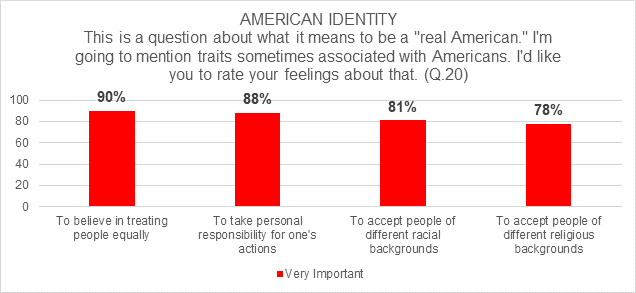Who is a Real American? Overwhelming Agreement on the Answer
What does it mean to be a “real American”? That was one of the many questions asked in the latest Grinnell College National Poll. The majority of respondents said believing in treating people equally (90%) followed by taking personal responsibility for one’s actions (88%) were the two most frequently identified traits.
The Grinnell College National Poll was conducted by Selzer & Company, a nationally-renowned polling and research firm. The respondents also said the ability to accept people of different racial backgrounds (81%) and religious backgrounds (78%) were important traits to be a “real American.”
“Most of those polled think that basic agreement with certain ideals, such as treating people equally, valuing difference, and taking responsibility for your own actions, are important to being American,” Caleb Elfenbein, Associate Professor of History and Religious Studies at Grinnell College said. “I was especially happy to see that support for accepting people of different racial, ethnic and religious backgrounds far outweighs ideas of being American that focus on a particular kind of background or identity.”
The poll also found that a substantial minority of Americans subscribe to a more narrow view in which “real Americans" are those who are born in the United States (24%), who have lived in the United States most of their lives (23%), who are Christian (23%), or who speak English (44%). This more restrictive view of who is a “real American” is more likely to be held by Republicans than Democrats. For example, 32 percent of Republicans said that being born in America was “very important” to being a “real American” as opposed to just 18 percent of Democrats.
“A pretty significant minority of respondents believes that you need to have been born in the U.S., be Christian and speak English to really be American,” Elfenbein said. “This helps to explain contentious debates over immigration, and why some Americans perceive immigration to be a threat rather than a benefit to the country.”
Key Groups Face Discrimination
While Americans profess to place an importance on treating people equally, the Grinnell-Selzer poll results show there is a clear belief that certain cultural and ethnic groups face discrimination. Most (56%) believe Muslims experience a lot of discrimination, followed closely by African-Americans (52%) and LGBT people (52%).
“I was surprised, but pleased to see there is a recognition that discrimination is a part of everyday life for some Americans,” Elfenbein said. “This is a good basis to influence change.”
A higher proportion of Democrats believe these groups face a lot of discrimination compared to Republicans.
Support for Immigrants and Refugees
As the military patrols the southern border and there is widespread news coverage about a migrant caravan headed to the United States, there is little support for curtailing the number of immigrants.
The Grinnell-Selzer poll asked respondents whether the number of immigrants coming from eight different countries should increase, decrease or remain the same. There was broad base of support to increase or keep the numbers of immigrants coming into the country the same.
“Many Americans will say ‘my family came here in the 1900s’, so they feel a connection to the people who are coming today,” said Sharon Quinsaat, Associate Professor of Sociology at Grinnell College.
Support for allowing refugees into the U.S. is also high. For example, fifty-five percent of people questioned believe this country has a moral responsibility to grant asylum and allow those who are fleeing violence or persecution to live in the United States permanently.
“There are many reasons that might cause a person to flee their home country,” Quinsaat said. “Whatever the reason may be, the opportunity for those refugees to find safe haven in America continues to resonate with Americans.”
Young People More Comfortable with Hate
The Grinnell-Selzer poll showed that hate of a person, group or organization is becoming more normalized. Thirty-two percent of those surveyed report feelings of hate directed at a politician, and 26% towards a political party.
“While there are several issues where people agree, there are still areas where Americans know they need to work on,” Elfenbein added. “The challenge comes not from identifying the difficult issues, but from finding solutions.”
The survey found that age and gender both have an impact on the findings, as the feeling of hate tends to be more prevalent among men than women. A majority of respondents under age 35 report hate; a majority of those older do not. Additionally, a majority of those who claim no religious affiliation (58%) report feeling hate towards at least one group or individual option provided by the survey.
“The normalization of hate among younger adults is startling, especially when it is compared to older generations,” said Peter Hanson, Professor of Political Science at Grinnell College. “Although 68 percent of Americans still believe it is unacceptable to express feelings of hate in a public manner, the increase in reported hate among youth could signal that our already contentious political sphere is set to become even more polarized.”
The second edition of the Grinnell College National Poll was conducted November 24-27, 2018 by Selzer & Company of Des Moines, Iowa. It surveyed 1,000 U.S. adults ages 18 and over, with a margin of error of the full sample at +/- 3.1 percentage points. Detailed poll information, including toplines and methodology, can be found on this website.
Additional videos featuring faculty discussions of the poll results can be found on the Grinnell College YouTube channel.






